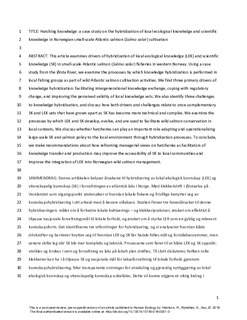Hatching knowledge: a case study on the hybridization of local ecological knowledge and scientific knowledge in small-scale Atlantic Salmon (Salmo salar) cultivation in Norway
Journal article, Peer reviewed
Accepted version

Åpne
Permanent lenke
http://hdl.handle.net/11250/2499743Utgivelsesdato
2018Metadata
Vis full innførselSamlinger
- Publikasjoner fra CRIStin - NINA [2364]
- Scientific publications [1392]
Originalversjon
10.1007/s10745-018-0001-3Sammendrag
We investigate drivers of hybridization of local ecological knowledge (LEK) and scientific knowledge (SK) in small-scale Atlantic salmon (Salmo salar) fisheries in western Norway through a case study from the Ørsta River. We find three primary drivers of knowledge hybridization in local fishing groups as part of wild Atlantic salmon cultivation activities: facilitating intergenerational knowledge exchange, coping with regulatory change, and improving the perceived validity of local knowledge sets. We also identify three challenges to knowledge hybridization, and discuss how both drivers and challenges relate to once complementary SK and LEK sets that have diverged as SK has become more technical and complex.We examine the processes by which LEK and SK develop, evolve, and are used to facilitate wild salmon conservation in these fisheries and discuss the role hatcheries can play adapting and utilizing large-scale SK and salmon policy to the local environment through hybridization processes.We conclude with recommendations as to how reframing managerial views on hatcheries as facilitators of knowledge production and transfer may improve both the accessibility of SK to local communities and the integration of LEK into Norwegian wild salmon management. Knowledge hybridization . Local ecological knowledge . Scientific knowledge . Norway . Salmo salar . Salmon cultivation Hatching knowledge: a case study on the hybridization of local ecological knowledge and scientific knowledge in small-scale Atlantic Salmon (Salmo salar) cultivation in Norway